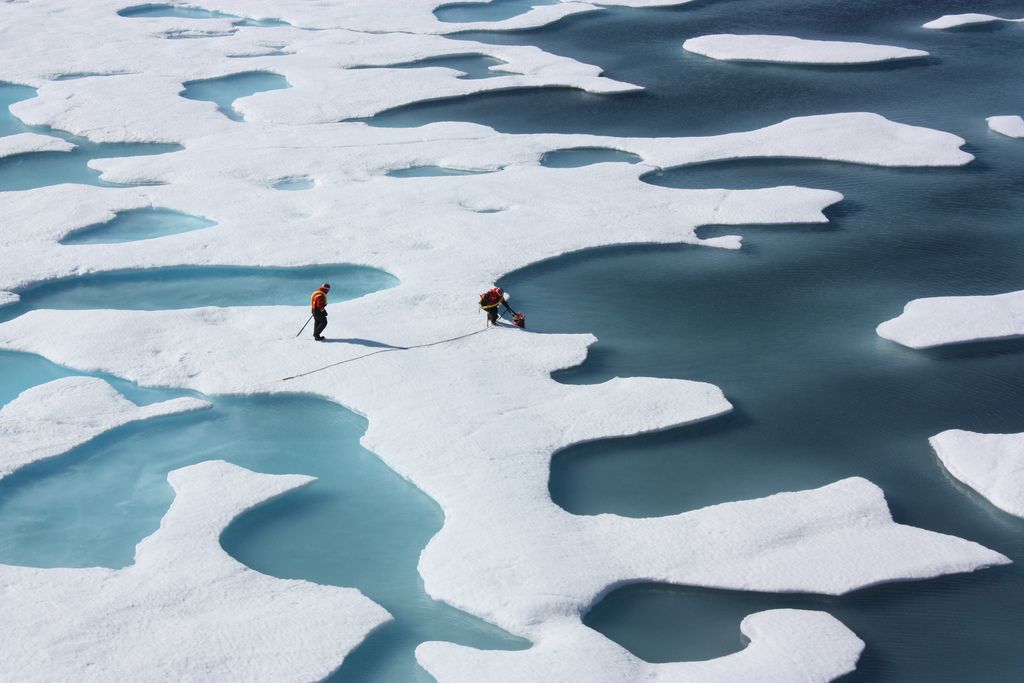
On July 12, 2011, crew from the US Coast Guard Cutter Healy retrieved a canister dropped by parachute from a C-130, which brought supplies for some mid-mission fixes. The ICESCAPE mission, or "Impacts of Climate on Ecosystems and Chemistry of the Arctic Pacific Environment," is NASA's two-year shipborne investigation to study how changing conditions in the Arctic affect the ocean's chemistry and ecosystems. (Photo by NASA/Kathryn Hansen/ flickr CC 2.0)
This post originally appeared at Scientific American.
There is a new incumbent in the White House, a new Congress has been sworn in and scientists around the country are nervous as hell.
We’re nervous because there seems to be a seismic shift going on in Washington, DC, and its relationship with facts, scientific reality and objective truth has never been more strained.
Already, in the opening days of his administration, Donald Trump’s press secretary, Sean Spicer, willfully ignored clear, empirical evidence about the size of the inauguration crowds, and bristled at the suggestion experts said they were smaller than in years past. He seemed almost paranoid, and insinuated that a media conspiracy — rather than simple arithmetic — was trying to embarrass his boss. And the Trump administration continues to claim, without any evidence, that widespread voter fraud cost Trump the popular vote, even though this has been thoroughly debunked by numerous, bipartisan sources — including his own lawyers.
Even more bizarrely, Kellyanne Conway, a senior advisor to Trump, has offered up the notion that “alternative facts,” rather than actual truth, were in play now. I don’t know what “alternative facts” are, but I think my parents’ generation would have called them “falsehoods” or even “lies.”
But it’s not just absence of facts that’s troubling; it is the apparent effort to derail science and the pursuit of facts themselves.
Already, we have learned that multiple agencies, including the USDA and the EPA, have ordered their scientists to stop speaking to the public about their research. The CDC suddenly cancelled a long-planned international conference on the health impacts of climate change. And when the Badlands National Park started using its Twitter account to discuss the issue of climate change — as any nature center, park or science museum might do — the tweets were immediately deleted. Most disturbingly, the EPA has immediately suspended all of their grants and contracts, and ordered the review of all scientific work by political appointees, including efforts to collect data, conduct research and share information with the broader public — a public, we should remember, that paid for the work in the first place.
And that was only five days since Trump took office.
A disturbing pattern seems to be emerging. Facts, and the pursuit of facts, don’t seem to matter to this White House. Or, worse yet, they matter a lot and are being suppressed.
“Fact-checking” the Trump campaign was always a surreal exercise, but we all knew that he came from the world of entertainment, and that shoot-from-the-hip, I-say-what-I-think style was part of his charm, part of his brand. People fed up with regular politicians loved his brash style. It was refreshing to many.
But now that Trump is in power, this is no longer about ratings and entertaining television. It’s about ensuring the fundamental legitimacy and credibility of the world’s most powerful office. If we can’t trust the “facts” being discussed in the White House, what can we trust?
Ultimately, a healthy democracy depends on science. The pursuit of truth, having an informed citizenry and the free and open exchange of ideas are all cornerstones of our democracy. That’s one thing that always made America truly great — the fact that, when all is said and done, evidence and the truth would always win the day in America. Without that, we join the league of ordinary nations.
And even if you aren’t worried about factual evidence, the veracity of our leaders or the independence of science from political interference, I would urge you to look a little farther down the slippery slope. If facts don’t matter to the White House, especially when they’re inconvenient, what’s next? Laws?
Let me be clear: This isn’t a partisan thing. Scientists aren’t — and shouldn’t be! — worried about which political party is in power. It rarely mattered: There has always been a long tradition of bipartisan support for science and a fact-based world view. In fact, the Union of Concerned Scientists has ranked both Republican and Democratic presidents as being exceptional supporters of science, including Abraham Lincoln, Teddy Roosevelt, Harry Truman, Richard Nixon, Jimmy Carter and George H.W. Bush.
Wise leaders of both parties have always recognized the value of independent science to our democracy.
But there’s something different about this administration. Something troubling. And scientists need to stand up and call it out. While we generally avoid political conversations, scientists should always stand up for facts, objectivity and the independence of science itself. Not doing so would be almost unethical.
So, to Mr. Trump, I would say this:
If this is all just a series of missteps, caused by overzealous mid-level managers during a confusing presidential transition, so be it. Say so. Fix it. Get out on the public stage and affirm your commitment to facts, to truth and to the independent pursuit of science without political interference. The vast majority of your fellow Americans would applaud you for this. It would be brave. It would be wise. And it would show some class.
But if this is actually part of your governing philosophy, I would give you a warning on behalf of my fellow scientists: Do not mess with us. Do not try to bury the truth. Do not interfere with the free and open pursuit of science. You do so at your peril.
Americans don’t look kindly on bullies, people who try to suppress the truth or people who try to intimidate scientists and the press. In the long run, this always backfires. The dustbin of history is full of people who have tried and failed. You will too.
The next time you visit the CIA headquarters, I hope you will take a moment to notice their unofficial motto, etched in the walls of the lobby. It says, “And ye shall know the truth and the truth shall make you free.” (John VIII-XXXII.)
It does. And scientists like me, and Americans of all backgrounds, will always fight for it.




